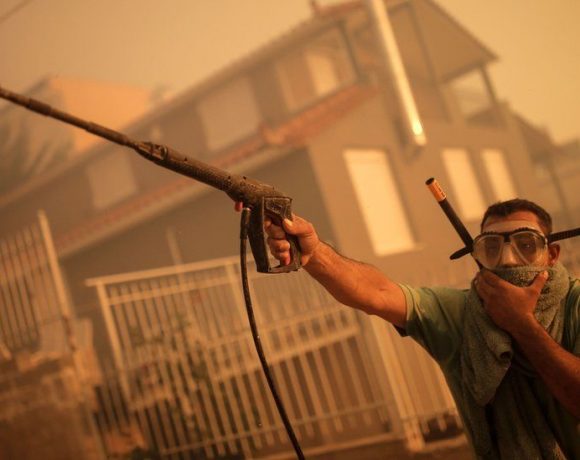
Amidst soaring temperatures, firefighters in Portugal are working diligently to contain wildfires that have spread across thousands of hectares. An overnight effort near Odemira involved around 800 personnel, leading to the evacuation of over 1,400 individuals. Tragically, nine firefighters have sustained injuries during the firefighting operations.
The Iberian Peninsula is expected to experience temperatures exceeding 40°C (104°F) this week. While three significant fires in Spain have been brought under control after scorching extensive areas, weather advisories persist across the country.
Portugal recorded its highest temperature of the year, reaching 46.4°C (116°F) in Santarém on Monday. A blaze that ignited near Odemira on Saturday was propelled southward into the Algarve’s hilly interior due to strong winds. Approximately 6,700 hectares (16,600 acres) of land have already been devastated, and numerous villages, tourist accommodations, and a camping site were evacuated. The mayor of Odemira described the situation as “critical, difficult, and complex.”
Elsewhere in Portugal, major fires prompted the closure of several sections of highways, including parts of the A1 connecting Lisbon and Porto. Firefighting efforts across both regions are being aided by sixteen waterbombing aircraft.
In response to the heightened fire risk, authorities have labeled over 120 municipalities in Portugal as being at maximum wildfire risk. Meanwhile, in Spain, fires near Cadiz, Huelva, and Catalonia consumed over 1,000 hectares (2,470 acres) collectively over the weekend.
This week’s heatwave marks the third to affect the Iberian peninsula this summer. According to Ruben del Campo of Spain’s State Meteorological Agency, the heatwave results from a substantial mass of hot, dry air originating from North Africa and is projected to be more intense, widespread, and longer-lasting than the two previous ones in July.
The increasing risk of such scorching and dry conditions that fuel wildfires is attributed to climate change. Global temperatures have already risen by around 1.1°C since the onset of the industrial era, and this trend will persist unless governments worldwide take significant measures to reduce emissions.
Picture Courtesy: Google/images are subject to copyright

